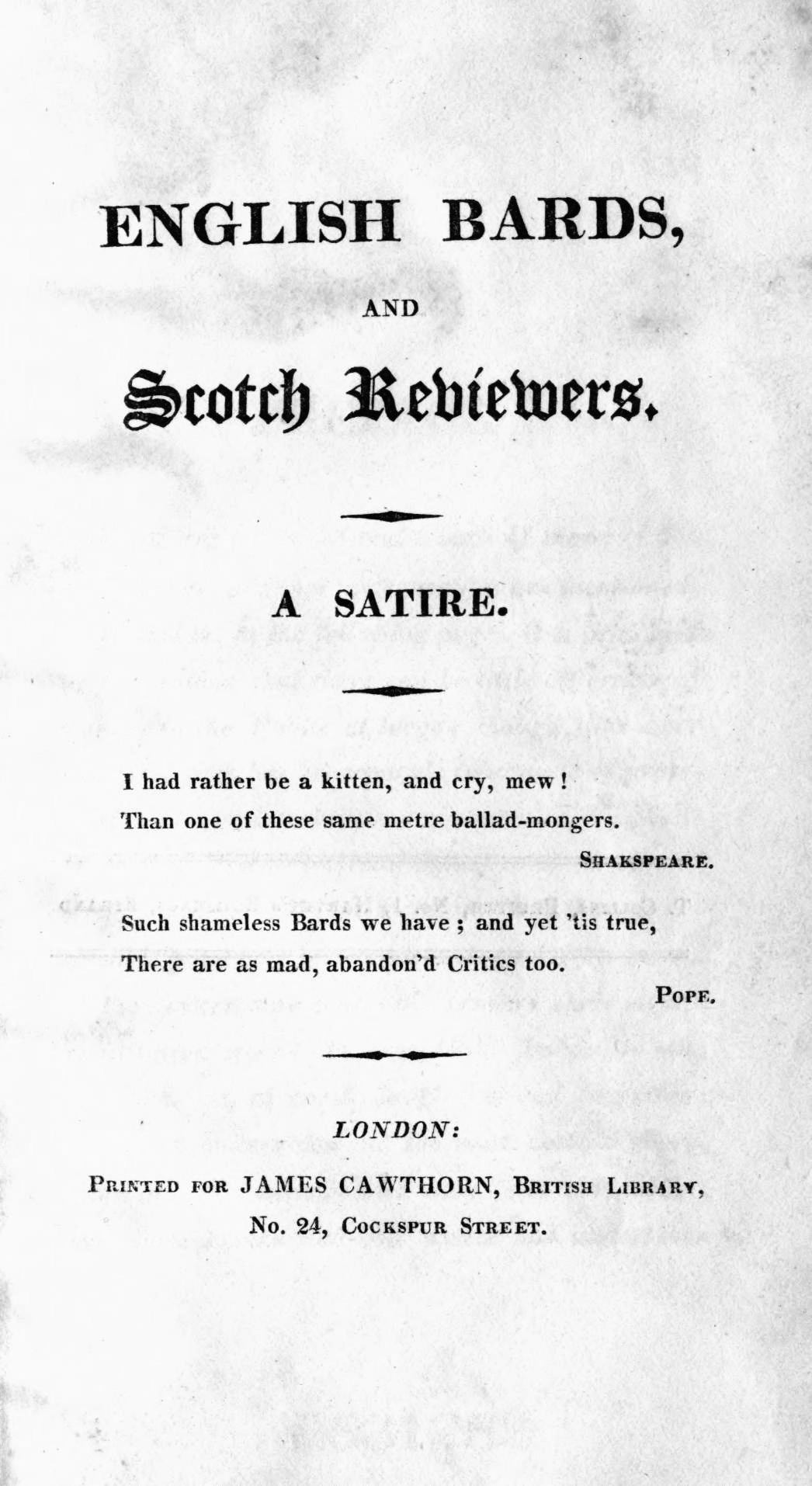English Bards And Scotch Reviewers on:
[Wikipedia]
[Google]
[Amazon]
 ''English Bards and Scotch Reviewers'' is an 1809 satirical poem written by
''English Bards and Scotch Reviewers'' is an 1809 satirical poem written by
 ''English Bards and Scotch Reviewers'' is an 1809 satirical poem written by
''English Bards and Scotch Reviewers'' is an 1809 satirical poem written by Lord Byron
George Gordon Byron, 6th Baron Byron (22 January 1788 – 19 April 1824) was an English poet. He is one of the major figures of the Romantic movement, and is regarded as being among the greatest poets of the United Kingdom. Among his best-kno ...
, and published by James Cawthorn in London
London is the Capital city, capital and List of urban areas in the United Kingdom, largest city of both England and the United Kingdom, with a population of in . London metropolitan area, Its wider metropolitan area is the largest in Wester ...
.
Background and description
The poem was first published anonymously, in March 1809, and a second, expanded edition followed in 1809, with Byron identified as the author. The opening parodies the first satire ofJuvenal
Decimus Junius Juvenalis (), known in English as Juvenal ( ; 55–128), was a Roman poet. He is the author of the '' Satires'', a collection of satirical poems. The details of Juvenal's life are unclear, but references in his works to people f ...
.
Byron had published his first book of poetry, ''Hours of Idleness
''Hours of Idleness'' was the first volume of poetry published by Lord Byron, in 1807, when he was 19 years old. It is a collection of mostly short poems, many in imitation of classic Roman poets.
Background
The volume was published in June– ...
'', in 1807. It received "strong censure" in a review by Henry Brougham, published anonymously in the ''Edinburgh Review
The ''Edinburgh Review'' is the title of four distinct intellectual and cultural magazines. The best known, longest-lasting, and most influential of the four was the third, which was published regularly from 1802 to 1929.
''Edinburgh Review'', ...
''.
Byron was already working on a poem called "British Bards", but the review, which he (incorrectly) attributed to Francis Jeffrey, prompted him to expand its scope; he made Jeffrey "the central figure in a wide-ranging satire on contemporary practices both in writing and in reviewing". In writing it, he drew on earlier satires, including the ''Baviad'' (1791) and ''Maeviad'' (1795) by William Gifford (1791), the texts published in the '' Anti-Jacobin'' (1797–1798), the ''Epics of the Ton'' (1807) by Lady Anne Hamilton and the ''Simpliciad'' (1808) by Richard Mant.
Byron used heroic couplets in imitation of Alexander Pope
Alexander Pope (21 May 1688 Old Style and New Style dates, O.S. – 30 May 1744) was an English poet, translator, and satirist of the Age of Enlightenment, Enlightenment era who is considered one of the most prominent English poets of the early ...
's '' The Dunciad'' to attack the reigning poets of Romanticism, including William Wordsworth
William Wordsworth (7 April 177023 April 1850) was an English Romantic poetry, Romantic poet who, with Samuel Taylor Coleridge, helped to launch the Romanticism, Romantic Age in English literature with their joint publication ''Lyrical Balla ...
and Samuel Taylor Coleridge
Samuel Taylor Coleridge ( ; 21 October 177225 July 1834) was an English poet, literary critic, philosopher, and theologian who was a founder of the Romantic Movement in England and a member of the Lake Poets with his friend William Wordsworth ...
, and Francis Jeffrey, the editor of the ''Edinburgh Review''. He praised instead such Neoclassical poets as Pope and John Dryden
John Dryden (; – ) was an English poet, literary critic, translator, and playwright who in 1668 was appointed England's first Poet Laureate of the United Kingdom, Poet Laureate.
He is seen as dominating the literary life of Restoration (En ...
. The poem went through several editions, but Byron finally suppressed the 5th edition in 1812 because he had come to regret his attitude toward those he had attacked.
Sources
* Garrett, Martin: ''George Gordon, Lord Byron''. (British Library Writers' Lives). London: British Library, 2000. . * Garrett, Martin. ''Palgrave Literary Dictionary of Byron''. Palgrave, 2010. . * Grosskurth, Phyllis: ''Byron: The Flawed Angel''. Hodder, 1997. .References
External links
* '' English Bards, and Scotch Reviewers'' on Wikisource. * {{Byron Satirical books Poetry by Lord Byron 1809 poems 1800s poems 1809 works